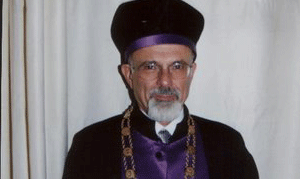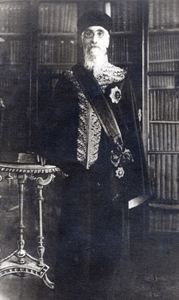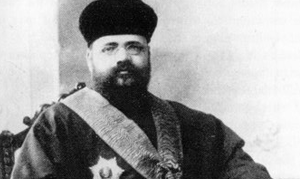First Chief Rabbi in Istanbul: Rabbi Moshe Capsali

Rabbi 0shak Haleva (2002-Present)
In 1453, when the Turkish Sultan Mehmed II conquered Istanbul from the Byzantine Empire, he selected Rabbi Moshe to guide the affairs of all the Jews living in the vast Ottoman Empire, most of whom were Greek-speaking Jews known as Romaniotes. This was thirty-nine years prior to the Sephardim’s arrival in Turkey after the Spanish Expulsion of 1492.
After arriving in Istanbul, Sephardic Jews would move out to their permanent homes, which the various communal organizations found for them, settling in the different districts of Constantinople such as Ortakoy and Kuzguncuk, as well as Haskoy and Balat.
Rabbi Capsali became the official representative of the Jewish people and had a seat in the Divan (Imperial Council). Rabbi Moshe Capsali's rank was higher than that of the Christian patriarch, being next to the chief spiritual leader of the Muslims.

Rabbi Mose Becerano (1920-1931)
He was born in Candia on the Island of Crete (Girit) in 1420. Not much is known about Rabbi Moshe Capsali's earlier life, except that he came from a prominent Jewish family, and that he studied the Torah in several important Yeshiva in Germany and other places. When he came to Constantinople, the community was small and poor. He was appointed a Dayyan (member of the Jewish Beth-Din, or Court). But, as we have seen above, after the city was conquered by the Turks, he became the Chief Rabbi, and his great gifts of leadership made him famous. Rabbi Moshe Capsali used his high office wisely, and he did much to help the growth of the Jewish communities in the Turkish empire.
He appointed qualified rabbis and communal leaders, and personally supervised all the affairs of the Jewish communities. He was also responsible for the taxes which the Jews had to pay to the Sultan. This was an important source of revenue for the Sultan; as the Jews had done well in developing the industry and commerce of the country.
Despite his high. position, Rabbi Moshe Capsali was always very humble, and he lived very simply and modestly. He spent much time in fasting and praying, and it was small wonder that he was loved and respected by all who knew him.
Towards the last years of his life, the great tragedy of the expulsion of the Jews from Spain took place (in 1492). Rabbi Moshe Capsali, his advanced age notwithstanding, threw himself body and soul into a great effort to help the victims. He personally traveled to various Jewish communities in his country to collect funds for Pidyon Shvuim, to redeem the Jewish refugees from Spain who had been captured by pirates and threatened with slavery.

Rabbi Haim Nahum Efendi. (1908-1920)
He also imposed a special tax, by the authority granted him by the Sultan, on Jewish communities in the Turkish empire, for the purpose of helping the Jewish refugees from Spain. Many of them were brought to Constantinople and welcomed with open arms by their more fortunate brethren.
Rabbi Moshe Capsali, at the age of 75, died three years after these first refugees arrived in Istanbul, and after his death, the work was continued by his successor as Haham Bashi, who was Rabbi Eliyahu Mizrahi. In 1497, when the kingdom of Portugal also expelled all of the Jews, it fell on Rabbi Mizrahi to make these converted or Portuguese refugees welcome and comfortable.
(Source: By Nissan Mindel, Kehot Publication Society)
CHIEF RABBIS OF ISTANBUL (1453 – 1835) *
Moşe Kapsali 1453 1496
Eliyau Mizrahi 1496 1526
Tam ben Yahya ? 1542
Eli Benjamen Ha-Levi ? ?
Menahem Behar Samuel ? ?
Eli Ben Haim 1575 1602
Yahiel Bassan ? 1625
Yasef Mitrani ? 1639
Yomtov Ben Yaeş 1639 1660
Yomtov Ben Hananya ben Yakar 1660 1677
Haim Kamhi ? 1730
Yuda Ben Rey ? ?
Samuel Levi 1727 ?
Abraham ben Haim Rosanes ? 1743
Salamon Haim Alfandari 1757? ?
Meir İshaki ? ?
Eliyau Palombo 1762 ?
Haim Yaakov Ben Yakar ? ?
CHIEF RABBIS OF OTTOMAN EMPIRE
(AFTER ESTABLISHMENT OF OFFICIAL OTTOMAN CHIEF RABBI POSITION)
Abraham Levi 1835 1836
Samuel Haim 1837 1839
Moşe Fresko 1839 1841
Yaakov Behar David 1841 1854
Haim Ha-Kohen 1854 1860
Yaakov Avigdor 1860 1863
Yakir Geron (1) 1863 1872
Moşe Levi (1) 1872 1908
Haim Nahum Efendi 1908 1920
Sabetay Levi (2) May 1910 and September 1912
İsak Ariel (2) November 1918 and September 1919
(1) Kaimakam of Chief Rabbi (Locum Tenens)
(2) Interim position
REPUBLIC OF TURKEY
Haim Moşe Becerano (3) 1920 1931
Haim İsak Şaki (4) 1931 1940
Rafael David Saban (4) 1940 1952
Rafael David Saban (5) 1952 1960
David Asseo (6) 1961 2002
İshak Haleva (7) 2002 Present
(3) Kaimakam of Chief Rabbi (Locum Tenens)
(4) As president of Bet Din
(5) First Chief Rabbi of Turkish Republic
(6) Second Chief Rabbi of Turkish Republic
(7) Third Chief Rabbi of Turkish Republic
Source: Compiled and prepared by Naim A. Güleryüz
(Photos: Courtesy of 500. Yil Vakfi)
Last modified onSaturday, 06 May 2017 10:07
Latest from Admin TOA
- World Energy Council Türkiye Holds the Opening Meeting of the Young Energy Leaders (YEL’26) Program
- The Shared Pulse by Eda Uzunkara
- NEO HUMAN 10.0: How Will the Future Be Shaped? (Filiz Dag)
- Calculatit.net Is Bringing Pricing Transparency to America’s Construction Industry
- Support Independent, Trustworthy Journalism








